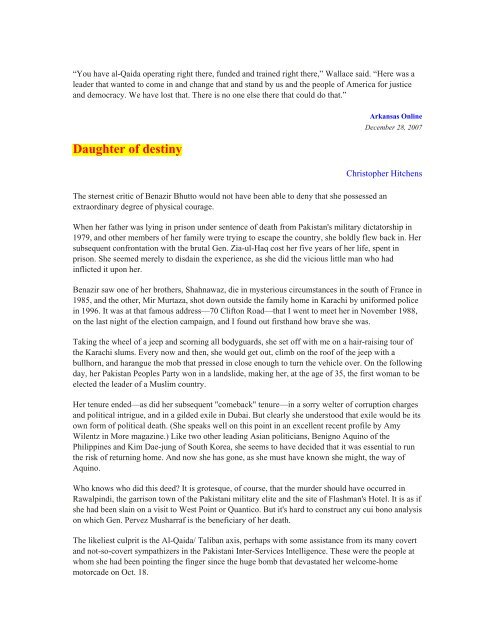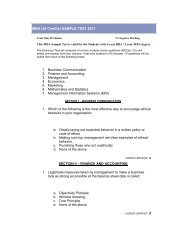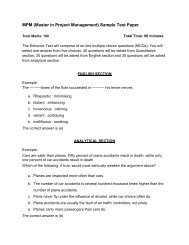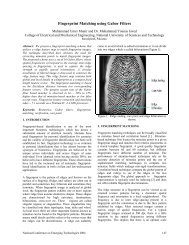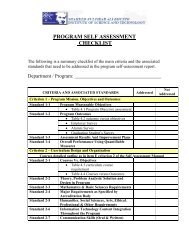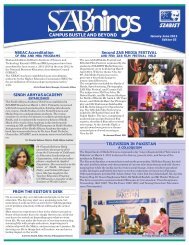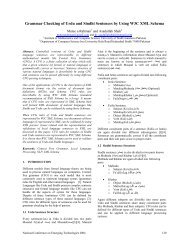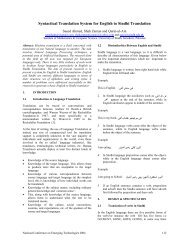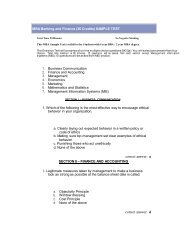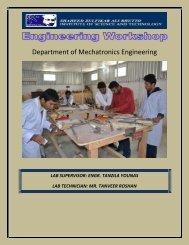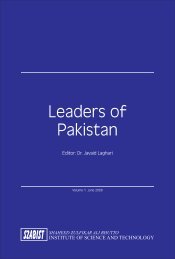Benazir Bhutto - SZABIST
Benazir Bhutto - SZABIST
Benazir Bhutto - SZABIST
You also want an ePaper? Increase the reach of your titles
YUMPU automatically turns print PDFs into web optimized ePapers that Google loves.
“You have al-Qaida operating right there, funded and trained right there,” Wallace said. “Here was a<br />
leader that wanted to come in and change that and stand by us and the people of America for justice<br />
and democracy. We have lost that. There is no one else there that could do that.”<br />
Daughter of destiny<br />
Arkansas Online<br />
December 28, 2007<br />
Christopher Hitchens<br />
The sternest critic of <strong>Benazir</strong> <strong>Bhutto</strong> would not have been able to deny that she possessed an<br />
extraordinary degree of physical courage.<br />
When her father was lying in prison under sentence of death from Pakistan's military dictatorship in<br />
1979, and other members of her family were trying to escape the country, she boldly flew back in. Her<br />
subsequent confrontation with the brutal Gen. Zia-ul-Haq cost her five years of her life, spent in<br />
prison. She seemed merely to disdain the experience, as she did the vicious little man who had<br />
inflicted it upon her.<br />
<strong>Benazir</strong> saw one of her brothers, Shahnawaz, die in mysterious circumstances in the south of France in<br />
1985, and the other, Mir Murtaza, shot down outside the family home in Karachi by uniformed police<br />
in 1996. It was at that famous address—70 Clifton Road—that I went to meet her in November 1988,<br />
on the last night of the election campaign, and I found out firsthand how brave she was.<br />
Taking the wheel of a jeep and scorning all bodyguards, she set off with me on a hair-raising tour of<br />
the Karachi slums. Every now and then, she would get out, climb on the roof of the jeep with a<br />
bullhorn, and harangue the mob that pressed in close enough to turn the vehicle over. On the following<br />
day, her Pakistan Peoples Party won in a landslide, making her, at the age of 35, the first woman to be<br />
elected the leader of a Muslim country.<br />
Her tenure ended—as did her subsequent "comeback" tenure—in a sorry welter of corruption charges<br />
and political intrigue, and in a gilded exile in Dubai. But clearly she understood that exile would be its<br />
own form of political death. (She speaks well on this point in an excellent recent profile by Amy<br />
Wilentz in More magazine.) Like two other leading Asian politicians, Benigno Aquino of the<br />
Philippines and Kim Dae-jung of South Korea, she seems to have decided that it was essential to run<br />
the risk of returning home. And now she has gone, as she must have known she might, the way of<br />
Aquino.<br />
Who knows who did this deed? It is grotesque, of course, that the murder should have occurred in<br />
Rawalpindi, the garrison town of the Pakistani military elite and the site of Flashman's Hotel. It is as if<br />
she had been slain on a visit to West Point or Quantico. But it's hard to construct any cui bono analysis<br />
on which Gen. Pervez Musharraf is the beneficiary of her death.<br />
The likeliest culprit is the Al-Qaida/ Taliban axis, perhaps with some assistance from its many covert<br />
and not-so-covert sympathizers in the Pakistani Inter-Services Intelligence. These were the people at<br />
whom she had been pointing the finger since the huge bomb that devastated her welcome-home<br />
motorcade on Oct. 18.


